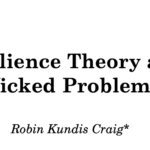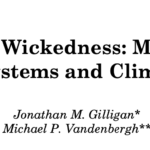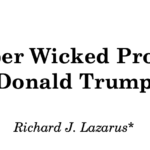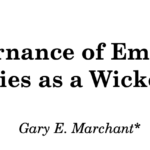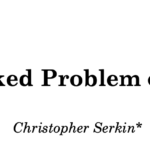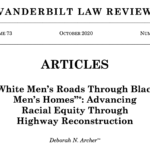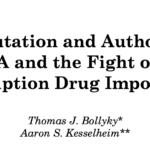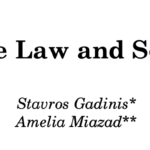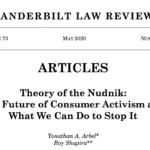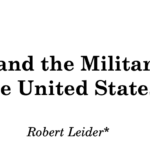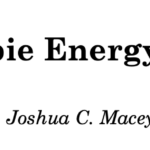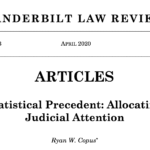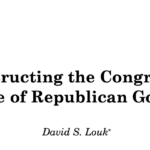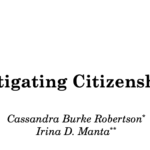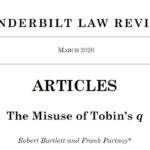Articles Category
Resilience Theory and Wicked Problems
Dec. 22, 2020—Robin Kundis Craig | 73 Vand. L. Rev. 1733 (2020) | This Article posits, first, that resilience theory offers important insights into our understanding of wicked problems and, second, that to understand the value of resilience theory to wicked problems, we should start by going back to the context of Rittel’s and Webber’s 1973 delineation...
Beyond Wickedness: Managing Complex Systems and Climate Change
Dec. 22, 2020—Jonathan M. Gilligan & Michael P. Vandenbergh | 73 Vand. L. Rev. 1777 (2020) | This Article examines the argument that climate change is a “super wicked” problem. It concludes that the wicked problem concept is best viewed as a rhetorical device that served a valuable function in arguing against technocratic hubris in the early...
The Super Wicked Problem of Donald Trump
Dec. 22, 2020—Richard J. Lazarus | 73 Vand. L. Rev. 1811 (2020) | In 2009 I published a law review article that both explained why I believed that climate change was a “super wicked” problem for lawmakers and offered specific recommendations for ways that any laws addressing climate change should be crafted in light of its super...
Governance of Emerging Technologies as a Wicked Problem
Dec. 22, 2020—Gary E. Marchant | 73 Vand. L. Rev. 1861 (2020) | Governance of emerging technologies . . . presents a conundrum. No single optimum solution exists, but rather a collection of second-best strategies intersect, coexist, and—in some ways—compete. This situation seems unsatisfactory until it is observed through the lens of the “wicked problem” framework. The...
The Wicked Problem of Zoning
Dec. 22, 2020—Christopher Serkin | 73 Vand. L. Rev. 1879 (2020) | Zoning is the quintessential wicked problem. Professors Rittel and Webber, writing in the 1970s, identified as “wicked” those problems that technocratic expertise cannot necessarily solve. Wicked problems arise when the very definition of the problem is contested and outcomes are not measured by “right and...
“White Men’s Roads Through Black Men’s Homes”: Advancing Racial Equity Through Highway Reconstruction
Oct. 19, 2020—Deborah N. Archer | 73 Vand. L. Rev. 1259 (2020) | Racial and economic segregation in urban communities is often understood as a natural consequence of poor choices by individuals. In reality, racially and economically segregated cities are the result of many factors, including the nation’s interstate highway system. In states around the country, highway...
Reputation and Authority: The FDA and the Fight over U.S. Prescription Drug Importation
Oct. 19, 2020—Thomas J. Bollyky & Aaron S. Kesselheim | 73 Vand. L. Rev. 1331 (2020) | There is popular and bipartisan support for legalizing the importation of lower-cost medicines from Canada to help reduce the high prescription drug costs that Americans pay. Despite the wide interest in this policy, attempts over the last sixteen years to...
Corporate Law and Social Risk
Oct. 19, 2020—Stavros Gadinis & Amelia Miazad | 73 Vand. L. Rev. 1401 (2020) | Over a quarter of total assets under management are now invested in socially responsible companies. This turn to sustainability has gained solid ground over the last few years, earning the commitment of hundreds of CEOs and dominating the global business agenda. This...
Theory of the Nudnik: The Future of Consumer Activism and What We Can Do to Stop It
May. 26, 2020—Yonathan A. Arbel & Roy Shapira | 73 Vand. L. Rev. 929 (2020) | How do consumers hold sellers accountable and enforce market norms? This Article contributes to our understanding of consumer markets in three ways. First, the Article identifies the role of a small subset of consumers—the titular “nudniks”—as engines of market discipline. Nudniks...
Federalism and the Military Power of the United States
May. 26, 2020—Robert Leider | 73 Vand. L. Rev. 989 (2020) | This Article examines the original meaning of the constitutional provisions governing the raising and organization of military forces. It argues that the Framers carefully divided the military between the federal and state governments. This division provided structural checks against the misuse of military power and...
Zombie Energy Laws
May. 26, 2020—Joshua C. Macey | 73 Vand. L. Rev. 1077 (2020) | This Article traces the development of three legal rules—cost recovery for vertically integrated utilities, the requirement that regulators assess the financial viability of energy projects before issuing a certificate of public convenience and necessity, and the filed rate doctrine—that emerged out of the view...
Spring 2020 Alumni Newsletter
Apr. 21, 2020—Vanderbilt Law Review Alumni Newsletter Spring 2020
Statistical Precedent: Allocating Judicial Attention
Apr. 20, 2020—Ryan W. Copus | 73 Vand. L. Rev. 605 | Suffering from a well-covered “crisis of volume,” the U.S. Courts of Appeals have patched together an ad hoc system of triage in an effort to provide cases with sufficient attention. For example, only some cases are assigned to central staff, analyzed by law clerks, orally...
Reconstructing the Congressional Guarantee of Republican Government
Apr. 20, 2020—David S. Louk | 73 Vand. L. Rev. 673 | The Republican Guarantee Clause of Article IV, Section 4 promises that “[t]he United States shall guarantee to every State in this Union a Republican Form of Government.” Although this clause might seem to confer significant power to oversee the political structures of the states, ambiguity...
Litigating Citizenship
Apr. 20, 2020—Cassandra Burke Robertson & Irina D. Manta | 73 Vand. L. Rev. 757 | By what standard of proof—and by what procedures—can the U.S. government challenge citizenship status? That question has taken on greater urgency in recent years. News reports discuss cases of individuals whose passports were suddenly denied, even after the government had previously...
The Misuse of Tobin’s q
Mar. 25, 2020—Robert Bartlett & Frank Partnoy | 73 Vand. L. Rev. 353 (2020) | In recent years, scholars have addressed the most important topics in corporate law based on a flawed assumption: that the ratio of the market value of a corporation’s securities to their book value is a valid measure of the value of the...
